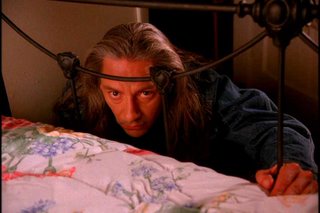
He wears a smile, everybody run.
When I started watching David Lynch and Mark Frost’s macabre, faux-soap opera TV series Twin Peaks, I was in the midst of a jarring moment of turmoil that had interrupted my otherwise peaceful existence. In other words, I was feeling much like the residents of the titular town.
The first episode presents a small, close-knit village, tucked away from the rest of the country in the mountains of the Pacific Northwest. Everyone knows one another on a first-name basis. Casual conversation topics, such as where the best slice of pie is, suggest a utopian society. Tragedy is scarce.
Then, when Laura Palmer — the idyllic town’s deceptively perfect homecoming queen — washes up dead on the beach in a body bag, the show suddenly becomes less about utopia and more about explaining why evil and darkness are always juxtaposed with perfection and prosperity. The ugly, Lynch seems to say, casts a shadow just as long, if not longer, than the good. And this truth is inescapable.
My viewing experience followed a similar trajectory. The night I started watching the show was a sad one during an otherwise wonderful semester. I was drunk; it was late; nobody wanted to spend time with me.
As I continued watching, I started to think regularly about the show’s symbol of pure evil, the psychopathic killer, BOB. BOB is a spirit inhabiting different people in the town, taking over their bodies and forcing them to murder others.
I started to see BOB a lot: in doorways, as a dark figure in my pitch-black bedroom — occasionally, even, in my dreams. Overcome with paranoia, I floated the idea once or twice that, like the poor characters on Lynch’s show, BOB was inside me.
One night, after I learned the identity of Laura Palmer’s killer and sat through the show’s unequivocal climax (to explain what this climax is would spoil the show), I could not fall asleep. My thoughts were scattered and frighteningly incoherent. Frantically, I jotted down everything that popped into my head.
It read like someone’s insane ramblings.
“Something particularly scary is happening in my brain right now,” I wrote. “My thoughts aren’t particularly destructive or bad or frightening; I just cannot quiet things. It’s as if I am a character in a dystopian novel, plugged into the scattered thoughts of my neighbors so that it sounds like a symphony, or cacophony, of nothingness. No rhyme or reason. No path. Just noises, mostly useless yet frustratingly ceaseless.”
I’ll never really know exactly what caused this panic attack; I haven’t had another Twin Peaks-inspired experience since. I still contemplate the possibility that BOB is next to my bed when I turn off the lights to go to sleep or waiting in my dreams to “catch me with his death bag” and inhabit my body.
But if the excitement of watching the show is something purely good, then the effect it had on my consciousness — the nagging fear that a piece of art could cause a future of anxiety — is what Lynch would most certainly deem the kind of pure evil that never goes away.
diversionsdbk@gmail.com



